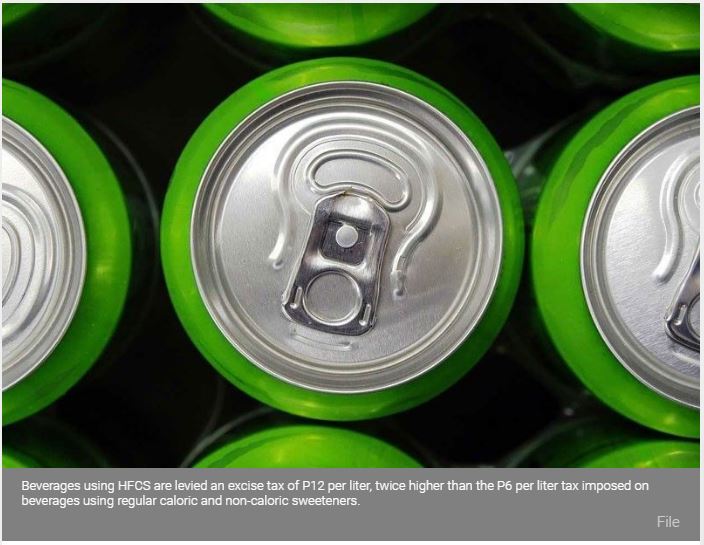Philippines: Revenue from sugar-sweetened beverages short of target
MANILA, Philippines — Excise taxes collected from sugar-sweetened beverages (SSB) fell short of target in 2018, raising questions on the type of sweetener used by beverage companies for their products, the Department of Finance (DOF) reported.
According to data sent by the DOF to reporters, excise taxes on sugary drinks generated P42.6 billion in additional government revenues last year, 11.9 billion or 21.8 percent lower than the target of P54.5 billion.
“Sweetened beverage excise is short by P11.9 billion as the industry claims that no high fructose corn syrup (HFCS) has been used since Jan. 1, 2018,” the DOF said.
Beverages using HFCS are levied an excise tax of P12 per liter, twice higher than the P6 per liter tax imposed on beverages using regular caloric and non-caloric sweeteners.
The DOF said the Bureau of Internal Revenue (BIR) has already started an audit to ascertain the claim that no HFCS has been used.
“At the same time, the FDA (Food and Drug Administration) is also in the process of verifying if firms did submit applications to reformulate from HFCS to regular sugar. This is required before firms can legally market a new formulation,” the agency added.
Earlier, Finance Undersecretary Karl Kendrick Chua said there may be a discrepancy in the tax being paid by beverage firms, hence, the shortfall in SSB excise collections.
Chua said only one company had secured the required FDA approval to convert its sweetener from HFCS to caloric and non-caloric sweeteners, while other companies that have not yet done so.
Sugar-sweetened beverages were imposed with excise taxes starting Jan. 1, 2018, pursuant to Republic Act 10963 or the Tax Reform for Acceleration and Inclusion (TRAIN) Law.
According to DOF data, net revenues generated from the TRAIN Law reached P68.4 billion in 2018, exceeding the P63.3 billion target by 8.1 percent.
The DOF said the biggest gains were seen in the personal income tax, automobile excise tax, tobacco excise tax and documentary stamp tax.
The agency said losses from personal income tax cuts under TRAIN was expected to be P146.6 billion, but actual losses were lower at P111.7 billion due to better compliance, an increase in registered taxpayers, and increase in jobs.
Incremental excise taxes from automobiles, meanwhile, reached P20.6 billion, higher than the P14.4 billion target due to increased purchasing power for imported vehicles.
Tobacco excise tax also rose by P9.9 billion, surpassing the P4.3 billion target due to compliance, while additional documentary stamp tax collections amounted to P33.8 billion, up from the P29.1 billion goal given higher transaction value and better collection efficiency.
On the other hand, the DOF said the biggest shortfalls were seen in the collection of excise tax on SSBs and the value-added tax (VAT).
Incremental VAT collections totaled only P7.7 billion, P31.5 billion lower than target, mainly due to lower revenue from imports.
However, the agency noted that P19.9 billion in additional VAT revenues was recorded due to the second round consumption effects of the additional take home pay–arising from personal income tax cuts–decreasing the VAT shortfall to P11.6 billion.
“Overall, TRAIN revenues exceeded its targets, providing additional public resources for infrastructure and human capital development programs. We expect the performance to be sustained in the coming years,” the DOF said.
Source: https://www.philstar.com/business/2019/05/13/1917281/revenue-sugar-sweetened-beverages-short-target#wSeAIOFik0wy6bqu.99


 Thailand
Thailand




